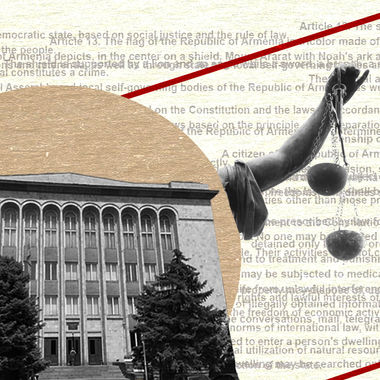Sun Jun 07 2020 · 8 min read
What Happened to the Constitutional Referendum?
By Ejmin Shahbazian , Maritsa Mandalyan

The planned constitutional referendum that sought to dismiss seven of the nine current judges of the Constitutional Court (CC) will be delayed indefinitely because of the COVID-19 pandemic, according to Prime Minister Nikol Pashinyan. The Electoral Code does not allow referendums to take place during a State of Emergency (SOE); however, when the SOE concludes, any postponed referendums must be held within 50-65 days. Within this legal context, Justice Minister Rustam Badasyan sent a request to the Venice Commission of the Council of Europe for its opinion on a new alternative to solving the “constitutional crisis.”
The “Yes” Campaign Position
The urge for change in the CC’s judges became more pressing after new CC judge Vahe Grigoryan’s letter to the National Assembly (NA), the President, the Government and the General Assembly of Judges of Armenia. In his letter, Grigoryan spoke of inconsistencies that exist between the CC “members” as described by the previous constitutions, and CC “judges” as defined by the current 2015 Constitution, including its eligibility requirements. As a solution, he suggested three alternatives:
- The first option is to not change the CC’s composition of judges and members;
- The second option is to present seven new nominations to replace the current “members” that were appointed under previous constitutional norms;
- The third option is to present the seven CC members with an early retirement option that will encourage them to resign voluntarily.
Heeding Grigoryan’s suggestions, the NA passed an early retirement package option for the affected CC members; however, none accepted the offer. The arrangement was actually criticized by the President of the Venice Commission due to the context of public rhetoric surrounding the package. Moving on to Grigoryan’s third option, on February 6, 2020, the NA voted to call a referendum on relieving the seven judges in question of their duties.Although the ruling party could have made the change without a referendum, they opted for one anyway because of the greater public legitimacy that it provided. The referendum was scheduled to take place on April 5.
Referendums require groups to register under the “Yes” and “No” campaigns with the Central Election Commission (CEC). The “Yes” campaign included 44 MPs (all members of the My Step Alliance). Their principal message was that the current Chair of the CC, Hrayr Tovmasyan, had been selected by the previous regime through an unjustifiable process that he himself had written into the 2015 Constitution. The “Yes” campaign argues that, under his leadership, the CC serves a corrupt group of previous officials and impedes the Government’s efforts at transitional justice. Pashinyan did underscore that the CC must remain an independent institution that provides a real check to the other branches, a principle that is a cornerstone of liberal democracy. He continued by claiming that the people do not trust the judicial branch and require the Government to solve systemic issues with the court system and ensure just outcomes. The failure of the court system to reform itself has been chalked up as a failure of the current government so far.
It needs to be mentioned that, in September 2019, the CC made a controversial decision regarding a loophole in the Criminal Procedure Code, which does not stipulate an exemption from criminal prosecution for officials enjoying special constitutional immunity. By declaring the relevant article of the Criminal Procedure Code unconstitutional, the CC made it more difficult for the prosecution to justify former President Robert Kocharyan’s pre-trial detention. He is charged with usurping power and corruption. In October 2019, the NA recommended the dismissal of current CC Chair Hrayr Tovmasyan because his affiliation with the Republican Party of Armenia (RPA) was inconsistent with the constitutional eligibility criteria of political independence. Prosecutors, to no avail, charged Tovmasyan with abuse of power, alleging that he profited from the rental of offices when he served as Justice Minister with the previous government.
Who is Saying “No”?
The referendum attracted half-hearted criticism from the two opposition parties in parliament. Members of the Prosperous Armenia Party (PAP) announced that they are not against the referendum, but they object to procedural errors that took place in calling it. They could have referred the constitutionality of the referendum to the CC for a ruling but chose not to do so because of the inherent conflict of interest. The head of Bright Armenia Party (BAP), Edmon Marukyan, stated that they consider the entire referendum process illegal. However, they refused to organize the “No” campaign because they did not want to be accused of defending the interests of the previous Serzh Sargsyan administration. The Armenian Revolutionary Federation (ARF) no longer holds any seats in parliament but a member of their Supreme Council, Artsvik Minasyan stated that the constitutionality of the referendum should have been referred to the CC. In an official statement, the RPA, which was also shut out in the December 2018 election, argued that the transitional provision in question ( Article 213 of the Constitution) has a specific mission, and that it can longer be amended once it has entered into force until that mission has been carried out. As such, the RPA called on citizens to boycott the referendum altogether.
Though they refused to organize the “No” campaign, the BAP, ARF and RPA did not forbid their party members from taking part in the “No” campaign.
Others criticizing the referendum point out that Article 213 could have been amended by a two-thirds majority in the NA, without spending approximately $5 million in taxpayer money to organize a referendum.
On February 18, a “No” campaign was finally registered by Ruben Melikyan, former Government Ombudsman of the Republic of Artsakh and co-founder of Legal Way NGO, and 60 other lawyers. The “No” campaign promised to be a platform for everyone that disagrees with the referendum, anyone who wants to vote no or boycott the referendum.
Does the CC Get a Veto?
Part 2 of Article 168 of the Constitution (Authorities of the Constitutional Court) stipulates that the CC shall, prior to the adoption of draft amendments to the Constitution as well as draft legal acts put to a referendum, determine the compliance thereof with the Constitution. According to Article 206 of the Constitution (Setting a Referendum), the referendum to approve a draft law can take place only after the CC decides on the constitutionality of that draft. It is the position of the lawyers representing the “No” campaign that, following these two articles, the draft of any constitutional amendment or referendum question must, first of all, be reviewed by the CC. Only if the CC gives a positive opinion (in accordance with the Constitution), can the Parliament then choose to put the suggested change to a referendum. The Parliament did not observe this procedure.
In the official justification to the proposed amendments, an argument has been made that the mere fact that Part 2 of Article 168 authorizes the CC to verify its constitutionality does not in itself mean that all legal arrangements within the scope of that authority cannot take place without the exercise of such authority by the CC. As substantiation for such a claim, the justification invokes Part 7 of Article 169, according to which the CC examines the case only in the existence of a relevant application. In order for the exercise of the power of the CC to be mandatory, an obligation to bring an application or a consequence for the lack of positive opinion by the CC had to be established for the subject applying to the CC, as is the case with other instances where the Court has supervisory authority. As a counter-claim to the need for the CC’s permission, Pashinyan mentions that the CC faces a conflict of interest and cannot render an objective and lawful decision on this particular question.
Siranush Sahakyan, the ex-Chair of the Commission on Ethics for High-Ranking Officials and co-founder of Legal Way NGO, in an interview with News.am, stated that the Constitution specifies the mandatory powers of the CC, provides for preliminary constitutional control of the draft of the constitutional amendment and further regulates that the NA has a duty to apply to the CC for an opinion. Taking into account what took place with this draft, it appears that the mentioned constitutional regulation has become discretionary and the exercise of the CC’s authority is subject to the discretion of the NA, which is unacceptable.
Varuzhan Avedikyan, lawyer and the former head of the Central Bank of Armenia’s legal department, expressed concerns over the observance of the principle of legal certainty, stating that it is not clear how the transition to the new composition of judges will take place. The government, in its plan to change the composition of the CC, has not presented any answers (or mechanism to answer) to vital questions such as who will take over the positions, how will they go about it, what will happen with the ongoing cases in the CC, and how long will they be postponed; all of which, at least from a business stand-point, will bring an unwanted delay to the constitutional-legal process and create legal uncertainty for an unknowable period.
Recent Developments
The new government has been steadfast in refuting all the criticism; however, governmental officials’ actions imply that the ruling party would like to have all options on the table.
Justice Minister Badasyan has not provided the press with the exact text of his request, but in an interview revealed that the government is seeking “expert opinion” on CC judges’ tenure in the context of working constitutional provisions. The request to the Venice Commission came days after George Kent, U.S. Deputy Assistant Secretary of State for European and Eurasian Affairs, urged the government to refrain from radical stances in judicial reform and to heed the Venice Commission’s suggestions. Ruben Rubinyan, Chairman of the National Assembly’s Standing Committee on Foreign Relations, claims that the government intends to ensure a 12-year tenure for all CC judges, as envisaged by the 2015 constitution if the transitional provision did not apply. By annulling this provision, two judges will resign, and another two will resign in 2022. Judge Tovmasyan will only resign his position of Chair. The Government expects an answer from the Venice Commission in June.
A draft amendment to the ‘Law on Referendums’ proposed by My Step MP Vahagn Hovakimyan, will allow the NA to cancel referendums altogether, creating an exit option for the Government to avoid the automatic resumption of the referendum campaign after the expiry of the State of Emergency. In the debates on the bill, the initiative was presented as eliminating uncertainties in the law and not necessarily as a change in the Government’s plans. The opposition remains skeptical; PAP MP Naira Zohrabyan is concerned whether the draft amendment conforms with the constitution itself and claims that this may be a political move to dodge the risk of not getting enough votes to oust the CC judges through a referendum. Parliamentary majority leaders imply that the new administration is looking for milder changes with regards to the CC rather than mass dismissal envisioned by the referendum. The draft allowing referendums to be cancelled has been approved by Parliament and requires the President to sign it into law. (His only other option is to refer it to the CC.)
Armenia Gets Serious About Reforms: Making Sense Out of Vetting
By Nerses Kopalyan
As an instrument of transitional justice, vetting is designed to “cleanse” state institutions that are tainted by systemic corruption, nepotism, and incompetence. Vetting of personnel is the first step toward the broader goal of institutional reform, writes Dr. Nerses Kopalyan.
Understanding Armenia’s Constitutional Court
By Lusine Sargsyan
Lusine Sargsyan explains the history of the institution that is the subject of an upcoming referendum on April 5, 2020.
The Armenian Government’s Plan to Change the Constitution
By Lusine Sargsyan , Harout Manougian
Since Armenia’s independence, every head of government has shaped the country’s Constitution; Prime Minister Nikol Pashinyan has made it clear that he will not be an exception.






EVN Report welcomes comments that contribute to a healthy discussion and spur an informed debate. All comments will be moderated, thereby any post that includes hate speech, profanity or personal attacks will not be published.